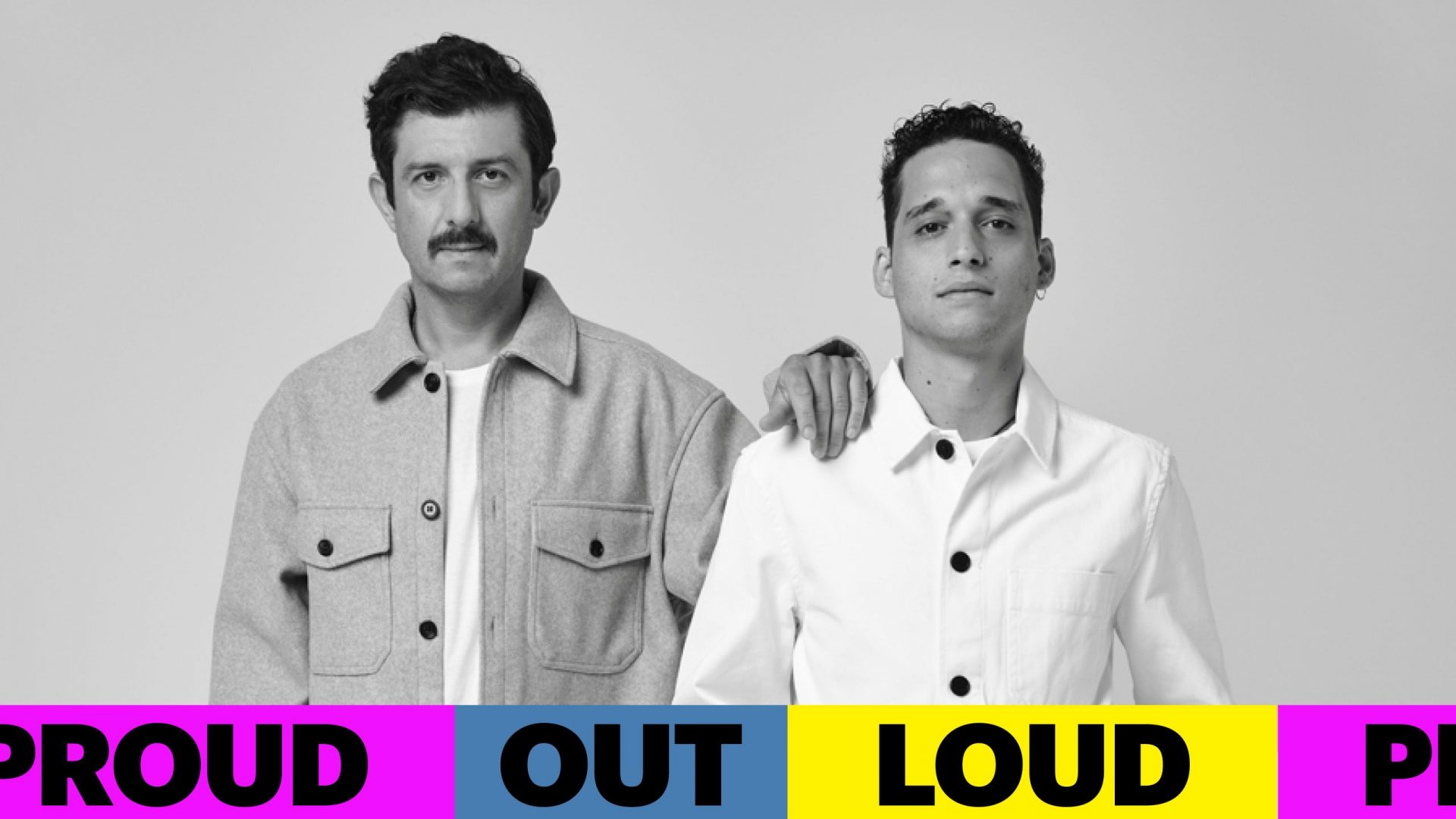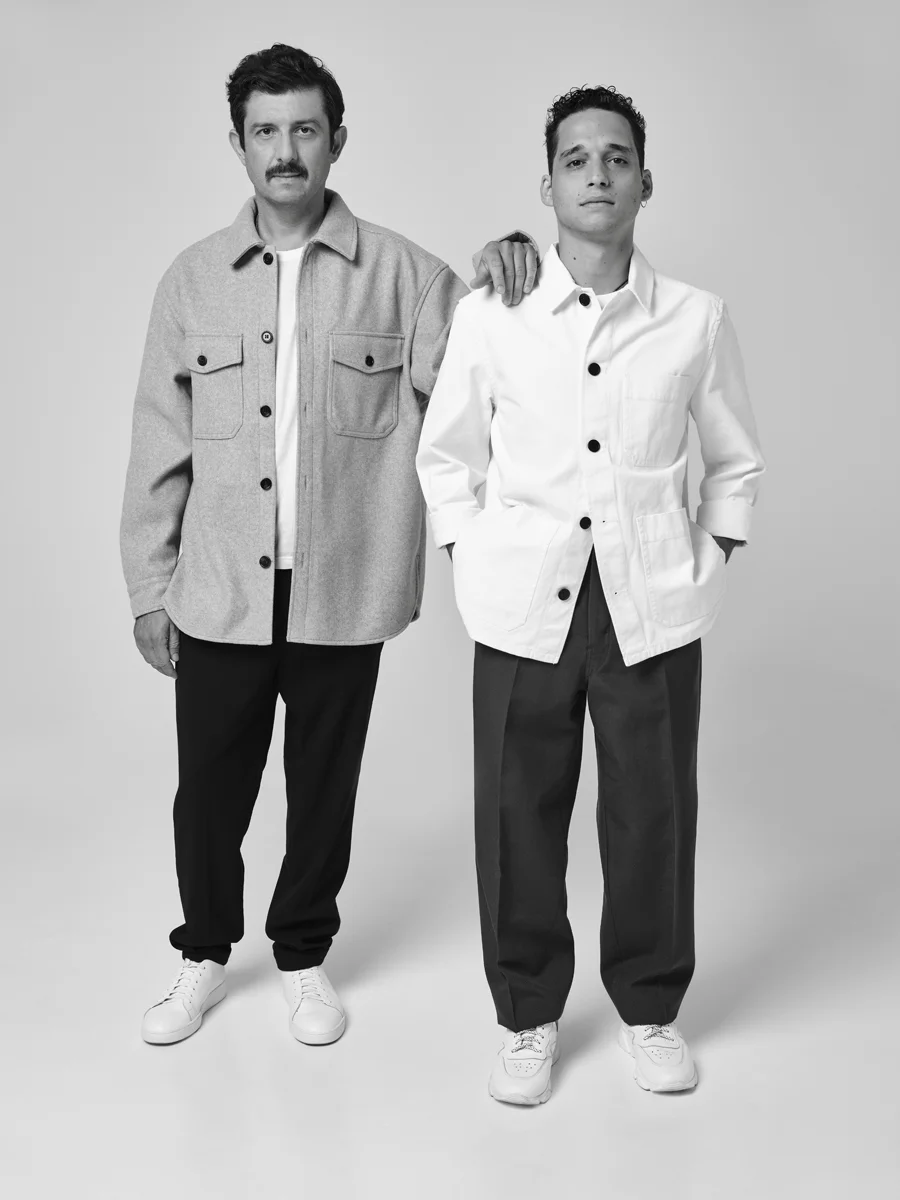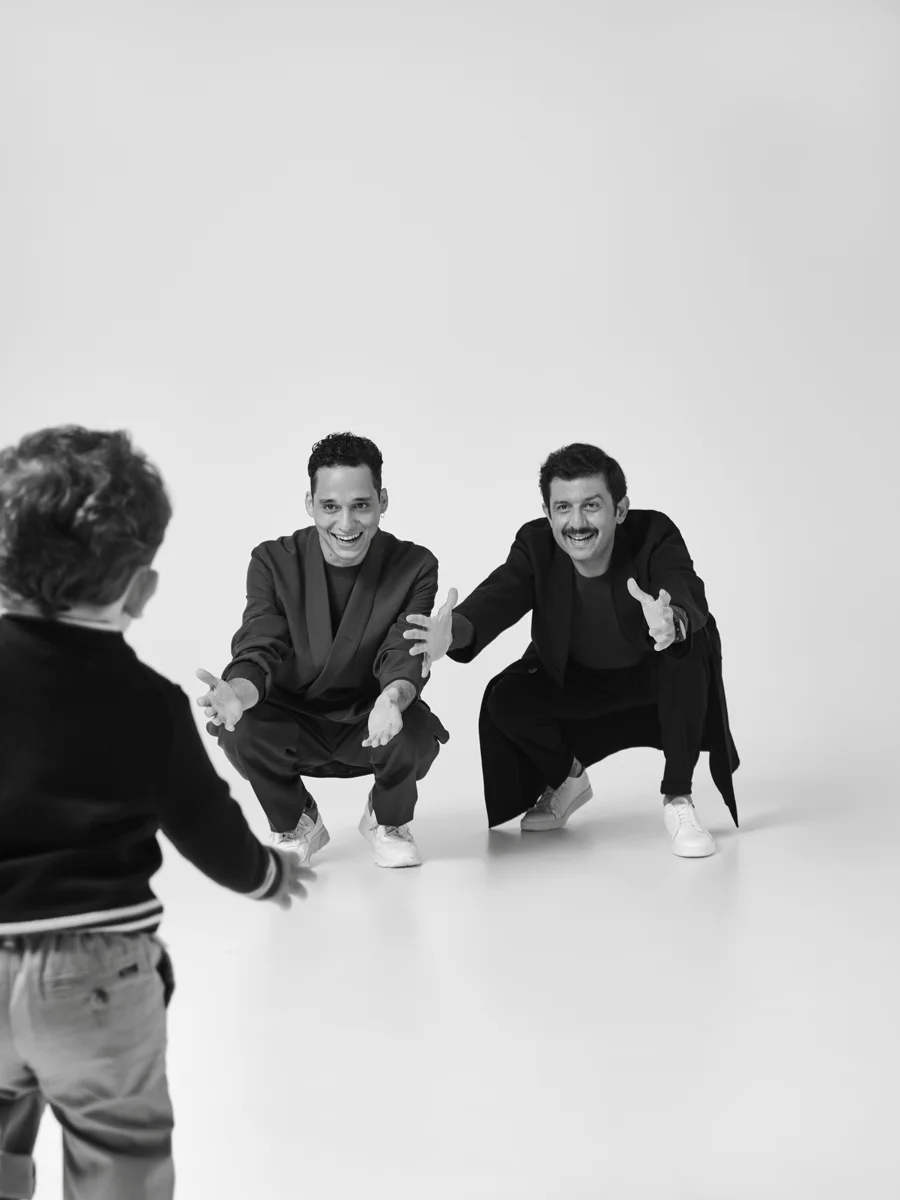
Michalis Economou | “Civil marriage should entail the right to same-sex adoption”
What is it like to be an LGBTQI+ family in Greece in 2022 and fight for the right to be recognised as such? Is society “ready” to accept civil marriage and same-sex adoption or is the State hiding behind arguments to the contrary in order to justify its negligence when it comes to securing equal rights for all its citizens? Eteron interviewed the well-known actor, Michalis Economou, and talked about such issues, among others. Michalis Economou and his partner, Giorgos Makris, have been raising their son Nikiforos together for the past four years.
Mr. Economou talks about the worries and difficulties that “invisible” parents have to face and also about what the possible repercussions in a child’s life are, due to the fact that the State won’t recognise both parents in cases of same-sex adoption. He states that a bill regarding same-sex civil marriage should entail the right to same-sex adoption. Overall, he remains positive: “If we embrace ourselves and we’re not embarrassed of who we are, then little by little, piece by piece, the whole of society can change, one neighbourhood at a time. I believe that this is where we’re headed.”
What are the difficulties that a same-sex couple with children have to face in their everyday life due to the lack of legal recognition of their right to marry, adopt, co-parent and share custody?
In our everyday lives, to talk about our family in particular, things are pretty regular. We’re a family just like any other – with the same worries, the same stress, the same love. On the other hand, we’ve been lucky enough not to have had to face any unforeseen troubles to this day. Still, if there’s a separation in a same-sex couple or if one of the parents dies – both of which aren’t unlikely to happen as they’re part of life – then it’s a whole other matter. The current situation regarding same-sex families is that one parent is the child’s natural parent or the one that has legal custody – as is the case with us, Giorgos has legal custody of our son – and the other is “invisible” since there’s no legal framework in Greece at the moment covering them. A same-sex couple isn’t recognised nor can they marry. The only available option in order to declare their status is civil partnership. If two same-sex people living in civil partnership want to adopt a child legally, they can’t. They can only become foster parents, which is rather different. It is more like hosting a child for a specific period of time and no parties have any rights.
So, all of us, including myself, as an “invisible” parent, aren’t covered by the existing laws. If for any reason my partner and I choose to separate, I won’t have the right to see my son. It will be up to my ex-partner to allow me to do so (or not), unless we sign a private contract of some sort and have it notarised but still, such contracts aren’t legally recognised by the State. Also, if the parent who has legal custody of the child passes away, who’s to guarantee that the State will grant custody to the other parent and not pursue the matter legally in order to assign the child to the closest blood relative? I mean, a child could be living with its family and all of a sudden the State can decide it has to go live in an institution or with its grandmother, even though the child has another parent.
I’m guessing that this situation makes the “invisible” parent feel insecurity or even fear. On one hand, there’s fear that if anything happens to his/her partner, the State might remove him/her from his/her child, since he/she won’t be recognised as the child’s parent. On the other hand, there’s insecurity regarding the child’s future. Is this the case?
Yes, except it’s not just the “invisible” parent who feels insecurity and fear. Both parents do, as well as the children themselves, as they’re exposed to life’s unforeseen circumstances. The family as a whole isn’t protected because of this specific legal gap. It’s clearly a two-speed society, where not all families have equal rights and neither do all the people. This is definitely a foul within the context of a democratic country, or at least of a country that tries to pass as democratic.
There have been talks of legal recognition of civil marriage for same-sex couples lately and it’s been mentioned that there could even be a relevant bill to be submitted to the Greek Parliament. Would such a move facilitate the process of same-sex adoption?
I’m not aware of the exact steps that would be taken. The way I understand this, though, when they pass a bill regarding civil marriage for same-sex couples – given the fact that it’s an issue that would affect family law – it should include an article regarding the right to adopt. The two things should go hand-in-hand. Yet, in this country, I am not sure how things will play out. It’s possible that when the bill is discussed, they’ll decide they want to vote for civil marriage for same-sex couples but against same-sex adoption. Unfortunately it appears that the State would need to show quite a lot of courage in order to pass both things at once.
Why do you think that there haven’t been any legislative initiatives towards this direction in Greece? Is it because governments past and present are lacking the necessary political will or is it because Greek society isn’t “ready” yet, as some claim?
I think that there is political will [to move forward] but unfortunately politicians are too scared that such a move would cost them votes – especially those belonging to the most conservative political parties that are currently governing this country. There’s this fear that they will lose the votes of a large part of society that is conservative, as well as the Church’s votes. I’m not sure whether or not society is ready for such a move. But looking back in times where other human rights were at stake, such as the right to civil marriage for straight people, there was quite a reaction from large parts of society then as well. The State at the time, to its credit, decided to move forward with that, despite the backlash. And here we are today with civil marriage being a part of our culture without it being a problem any more, as it’s widely accepted.
There will always be a part of society that won’t be fully prepared for something, but the State should lead the way – especially if there’s relevant pressure from the E.U. and it’s regarding things that should have happened long ago. If the State decides to take that step, society will follow. Still, I believe that things are getting better. Meaning that society has never been more ready to accept such matters than it is today. This is what we experience in our everyday lives.

This brings me to my next question. How do other parents treat a same-sex couple with a child, in your personal experience?
We wondered what the situation would be like when the time came to take our son to kindergarten. We didn’t know how they would handle things. I must admit that they were very open, though, and we realised that we didn’t need to search too much, meaning that we didn’t have to go looking for different kindergartens in order to find more inclusive environments where we could send our son. We found a very accepting environment at the first kindergarten we went to and a lot of good will to cooperate in order to make classes more inclusive. They were willing to include other family types, when they discussed families, and not just the mom-dad model. The same happened with parents of our son’s schoolmates that we’ve met at children’s parties. They were really cool with everything and we didn’t have to explain ourselves or our situation. They just accepted us.
This fact probably speaks to whether or not society is ready for the claims we were discussing previously.
Yes, I do feel that there’s a tendency of acceptance in the general population, I just wouldn’t go as far as generalising that to the whole of society. Still, both in the social media sphere as well as in TV series that are produced abroad and in Greece, I’ve noticed that there’s a certain visibility and acceptance. There’s also that part. But sure, amongst our close ones, the kid’s school, our friends, family and other parents we’ve seen great acceptance. We’ve never found ourselves in a difficult or awkward position. We never had to explain anything to anybody nor did we need to defend who we are.
In the next few years, your son, a child that’s part of an LGBTQI+ family, will go to school. Are you worried about the way other kids will treat him?
Yes and this is why we’re already thinking about which school we ought to send him to. Bullying as an issue both stresses and scares me, because the way things are nowadays, one could be bullied just because they have pointy ears, or whatever. We see young people getting stabbed in the street just for wearing the wrong colour T-shirt. Therefore I realise that the issue is beyond my control. What I can control is to raise our son to know who we are, to not be embarrassed because of who we are, to accept himself and if possible, to give answers whenever needed and to defend himself. And of course to not accept oppression. To not feel as if he’s an alien creature that does not belong. And then the ball is back in the State’s court. If the State doesn’t decide to embrace us and to include us in the sphere of what’s normal and factual, society will have a hard time following. LGBTQI+ families shouldn’t have to fight alone. The State should support us and when that’s done, society would too.

Is there anything that you, as a parent, would like to add to the education system? Something that could maybe facilitate children’s lives and especially those of LGBTQI+ children and children who are members of LGBTQI+ families? Something like a school module for example or a comprehensive sexuality education?
It crosses my mind with increased regularity that there should indeed be a module in schools, but I wouldn’t limit it to sexuality education. I’m not sure what I’d call it. Its description would be an acceptance and tolerance class that would focus on three pillars: First of all, self-acceptance. It would be about kids who feel different for whatever reason, be it because they’re overweight, LGBTQI+ and so on. Secondly, acceptance of the “Other”. Thirdly, kids would learn how to connect and relate to others. This last pillar could contain sexuality education but wouldn’t be limited to that. Sex is part of the discussion about the acceptance of others and the boundaries I need to establish regarding how much I want someone else to touch me. It includes discussions regarding rape, femicides and a broader need for educating and instructing children. But in order for such a class to be understood, it needs to be based on our experiences, so to start from our own selves. In other words, we should learn how to love ourselves and others. Focus on what we have in common (which is a lot) instead of our differences that are justifiably there. We should remember that there are way more things that unite us than things that divide us.
As a conclusion, is there a message you’d like to share with those who will read this interview?
Since Eteron is an Institute for Social Change, I’d like to say that social change starts with self-acceptance and then spreads to each person’s microcosm – our parents, siblings, co-workers, schoolmates, neighbours. If we exist proudly within this frame, without fear, then this could be a boost so that an LGBTQI+ person can one day, when they’re ready, speak or come out to their parents. I speak from personal experience. After I spoke to my parents and felt their acceptance – I was lucky on that front – then I found the strength to come out to other relatives, to my neighbourhood, at work and, as a public figure, to society. I think that this is how we can slowly change society, even if we’re not all public figures that can address different kinds of people. If we embrace ourselves and we’re not embarrassed of who we are, then little by little, piece by piece, the whole of society can change, one neighbourhood at a time. I believe that this is where we’re headed. I’m optimistic on that front.
Michalis Economou is an actor. He is currently in rehearsals for Dimitris Karatzas’ version of Aeschylus’ tragedy “Persians” that will open in the Ancient Theatre of Epidaurus on June 15th and 16th. He’s also part of the cast of the TV series “Our golden years” (Ta Kalytera Mas Chronia) that is being broadcasted by the Greek National broadcaster ERT1.
Photo credits: Γιώργος Καπλανίδης